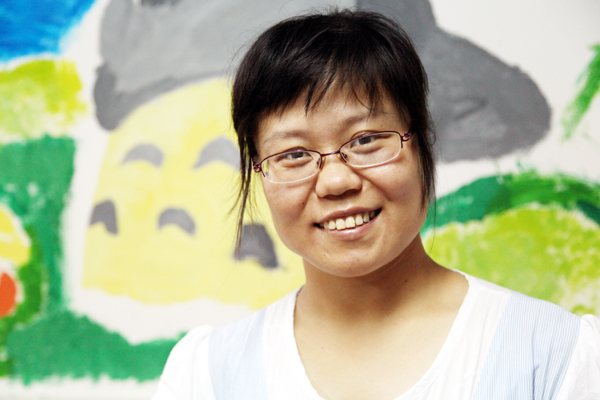 |
|
Zhou Lijuan, a social worker, stands in?front of the wall painted by the children?in the community center of Lengquan village in northwest suburban Beijing on July 20, 2012. [Photo by Fan Zhen/chinadaily.com.cn]? |
When I met Zhou Lijuan for the first time, she insisted giving me one business card.
"I haven't got much chance to do so," the mother-to-be said in a chipper tone.
Zhou came to Lengquan village after she graduated from China Women's University four years ago. Although she majored in social work which is the star course of the college, she never thought of being a social worker.
In fact, most of her former classmates did not turn out to be social workers after their four-year undergraduate studies. "It is tiring, underpaid and most of all it is not commonly accepted or valued by society," Zhou said.
Whenever a novice or an intern asks her about the salary, Zhou never tries to hide the facts.
"My salary has recently risen to 3,000 yuan a month," she said. "It is almost as much as those fresh graduates earn in their first job except that I've worked for four years."
Zhou's?salary used to be paid out of the funds from a project at Peking University. Once the funds were used up,?she lost the basic income it provided.
Although some passionate college students were not scared away by the hard living conditions, and the unexpectedly low salary, they were driven away by the uncertain career future.
It was hard for them to explain to their parents what a social worker does and where the job would lead. Even Zhou could not give me an answer.
Zhou wanted to be a civil servant and live a nine-to-five life with a steady and good salary. "I was a straight A student in college just like them," she says, pointing to the volunteers of Dean D’Art. It was a makeshift plan for her to come to the village to be a social worker.
"I didn't plan to stay long, but four years has passed, and now I don't want to leave," Zhou said.
Although she never identified the reason, I could sense there was a bond between her and the village, and when I saw the way she looked at the playing children who surrounded her and called her "sister Zhouzhou", I understood.
"Children can be troublesome if you know what I mean," Zhou says, recalling a time when one girl talked to her about her angst for a whole day, while a gang of children were screaming and running around the room. "I almost lost my patience. I just felt I couldn’t handle it."
She hung on after all.
But "future" is always a word that silences Zhou.
Zhou's identity card was changed to those of Beijing citizens when she studied in college. It is the only thing that theoretically differentiates her from the villagers. But the card will become invalid in two years.
"I will be one of the 'floating populations' eventually, and my child will be like one of these children I've helped. It is quite ironic," Zhou said.
When I asked Zhou whether I could write about what she had told me, because some of the remarks may have touched the "sensitive issues".
But she smiled and said, "'The sensitive issue'only exists in the mainstream world. You call it 'sensitive', but to us, it is our life."
Contact the writer at fanzhen@chinadaily.com.cn
|
|
|
|
|
|
